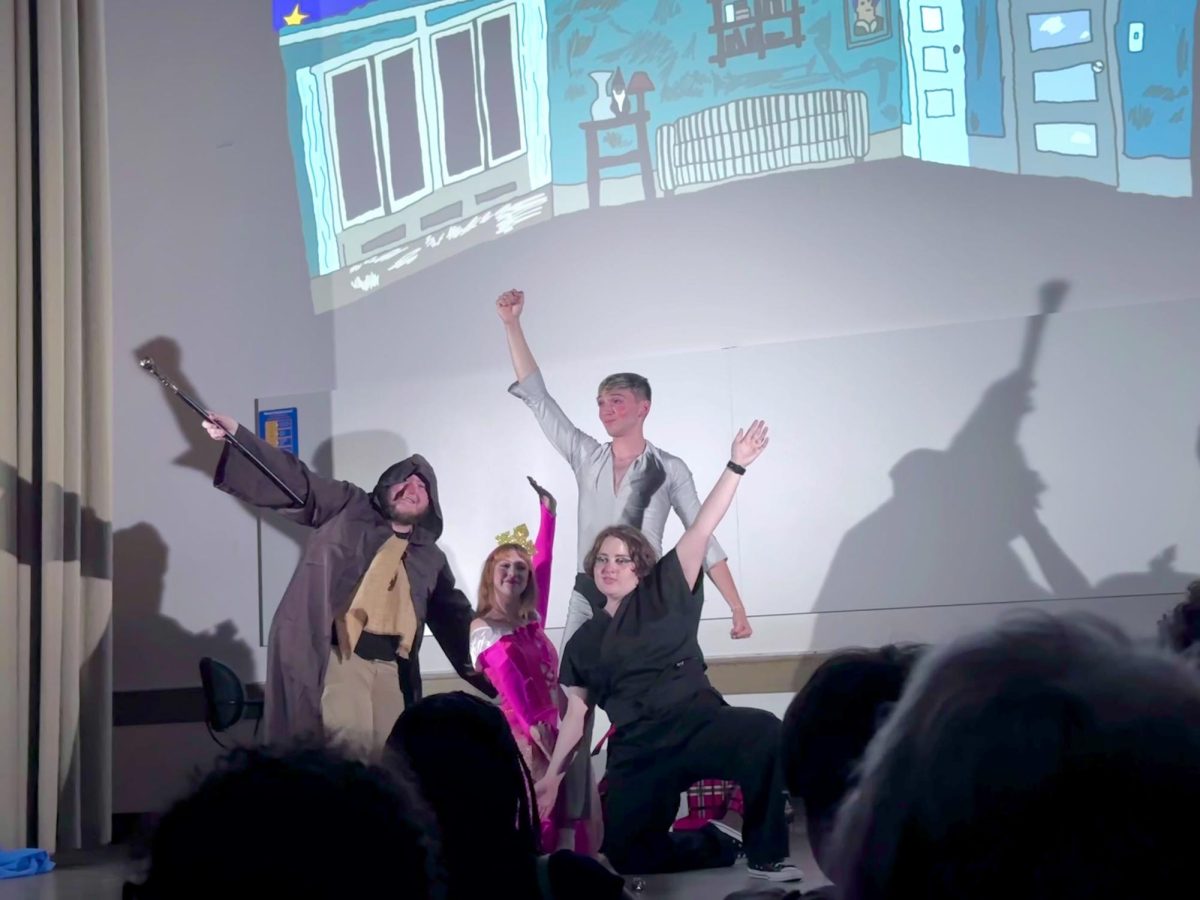Dean Merritt waddled onto the Frick Fine Arts stage last Friday cloaked in tattered robes and flaunting a crude prosthetic nose. The senior accounting and finance major was Frank Reynolds, the fictional South Philadelphia bar owner portrayed by Danny DeVito in FX’s show “It’s Always Sunny in Philadelphia.”
In this theatrical retelling of the 2008 episode “The Nightman Cometh,” the main characters stage a bizarre amateur musical with a winding plot following a love affair between a young boy and a princess who works in a coffee shop. Parallel to his love story with the princess, the boy — who spends most of the play dressed in baby blue pajamas — must escape a troll’s captivity and defeat the Nightman, the cat-eyed antagonist.
Merritt, whose character plays the troll, said the soul of the role is embodying DeVito’s physicality.
“The key is you gotta get the posture just right. I feel like I already don’t have the best posture, but you gotta be at a 45-degree angle to play Frank,” Merritt said. “Once you enter that troll mode, it’s hard to do anything but a perfect performance.”
The cast, comprising eight Pitt students, performed for an audience of over 60 “It’s Always Sunny in Philadelphia” enthusiasts in the Frick Fine Arts Auditorium on September 29. Logan Caplan, a junior law, criminal justice and society major who played the princess and directed the musical with Alaina McCall and Christina Carbo, said “The Nightman Cometh” represented an intersection of their passions.
“I’m a power-thirsty control freak, so I’ve been really enjoying directing and doing all the offstage stuff like costuming and organizing some of the marketing and fundraising,” Caplan said. “It combines all the things I like.”
The musical ventured beyond just the fictional play into its haphazard gestation in the original episode. Thomas Riley, a junior politics and philosophy major, played Charlie Kelly, the writer and director of “The Nightman Cometh.” He creates the musical in an attempt to woo Christina Carbo’s character, the waitress. Carbo, a junior political science major, said the production was a passion project for everyone involved.
“We’re all huge fans of ‘Sunny,’” Carbo said. “When [Caplan and McCall] came up with putting on a production of ‘The Nightman Cometh,’ we figured why not?”
Nearly everyone in the cast also writes for Pitt Tonight, Pitt’s student-run late night comedy show. Several Pitt Tonight crew members lent their lighting, costuming, audio and videography equipment and abilities to the “The Nightman Cometh.” Caplan said the funds they raised charging $5 for admission to the play would go toward new production gear for Pitt Tonight.
“Everyone is excited about it — we have people from different parts of Pitt Tonight coming in,” Caplan said. “We have people who are doing production and marketing even helping us. It’s a group effort.”
A year after the original episode aired, the cast of “It’s Always Sunny in Philadelphia” acted in the stage adaptation “The Nightman Cometh Live!” The live musical featured several new songs not heard in the episode. Caplan said the production heavily influenced their version, but they had to improvise since materials were scarce.
“There’s a lot of resources we don’t have to make all the technical stuff happen,” Caplan said. “We took aspects of both [the episode and the musical] as far as what was manageable for us to put on the stage and what felt most comfortable for everybody. It was definitely a big inspiration… It’s a 20-minute episode. I think now we’ve got a 45-minute show.”
The story concludes with a musical crescendo after the young boy transforms into the Dayman, shoots and kills the troll and rips out the Nightman’s heart. The final song ends with Charlie, dressed head to toe in a golden tuxedo, top hat and cardboard sun, singing in a wavering falsetto to reveal that he is the Dayman in the future. He descends into the audience and publicly proposes to the waitress. She says no and storms out of the theater. The actors give a consolatory bow, the curtains draw and the play ends.
With the musical featuring intentional line flubs, self-referential humor and countless fourth-wall breaks, Caplan said the dimension of amateur actors playing amateur actors added a meta twist to the play.
“The point of the whole musical is stupidity. It’s stupid as hell. It’s actors acting like they can’t act,” Caplan said. “We have some amateur actors in the cast and we have some people with stage experience, but I think it all comes together nicely.”


